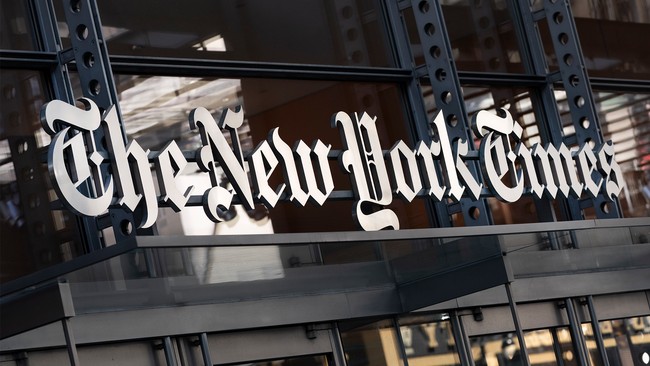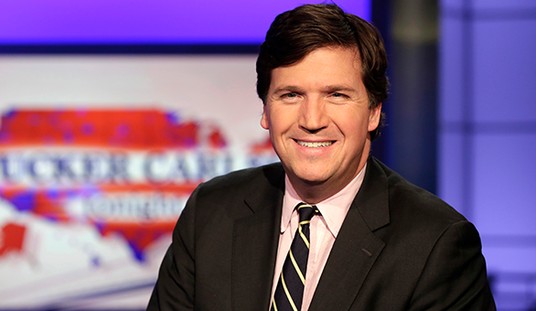


Among the many media gloaters over the Fox News-Dominion defamation settlement, The New York Times seems to be gloating the loudest.
But this gloating strikes some history buffs as highly hypocritical.
Can Cubans who – back in 1959 – went blue in the face warning the U.S. State Department and CIA that Castro was a closet-Soviet-asset and communist sue The New York Times for defaming them as crooks and liars?
Surely their case (the Cuban blue-in-the-faces) has been vindicated much more starkly than Dominion’s.
Starting in 1957, for instance, The New York Times devoted itself to assuring readers that—unlike what those insufferable, loud-mouthed, wildly-gesticulating Cuban deplorables were frantically warning the CIA and U.S. State Department about– the Castro regime was in fact antiseptically free of the slightest communist taint.
“Fidel Castro (who at the time led a KGB-sponsored terrorist group in Cuba known as the July 26th movement) has strong ideas of liberty, democracy and social justice. This amounts to a new deal for Cuba, radical, democratic, and therefore anti-communist," said Herbert Matthews of the Times in February of 1957.
Two years later, with a Cuban version of Poland’s Katyn massacre in full swing (and directed by the same Soviets for the same reason), The New York Times' veritable Herbert Matthews double-downed in 1959: “This is not a Communist revolution in any sense of the term. Fidel Castro is not only not a Communist, he is decidedly anti-Communist.”
In fact, vengeance, much less justice, had nothing to do with the Communist bloodbath The New York Times was trying to camouflage. Che's murderous method in La Cabana fortress in 1959 was exactly Stalin's murderous method in the Katyn Forest in 1940. Like Stalin's massacre of the Polish officer corps in the Katyn forest, like Stalin's Great Terror against his own officer corps a few years earlier, Che's firing squad marathons were a perfectly rational and cold-blooded exercise that served their purpose ideally. This bloodbath decapitated, literally and figuratively, the first ranks of Cuba's Contras. This is Bolshevik takeover 101, amigos.
Recommended
One day in May 1959, only five months after the triumph of Castro's glorious Revolución, proclaimed as “democratic and anti-communist” by The New York Times, Castro's own Air Force Chief, Major Pedro Diaz-Lanz, begged to differ. He told his friend Eddie Ferrer, "I've got to tell the Americans and the world what's going on here and start the fight against these communists. Everybody seems asleep!"
A week later, Diaz-Lanz resigned his post and declared publicly that Castro's civilian government was a hollow sham, nothing but a front (maintained with the then invaluable assistance of the Times) for Soviet-trained Communists who were running the show behind the scenes, especially in the crucial functions of the military and police. Diaz-Lanz then bundled his wife and kids onto a small boat and escaped to Miami just ahead of a firing squad.
After weeks of frantically knocking on doors and hoarse from phone calls, Diaz-Lanz finally appeared at a public hearing before the Senate Internal Security Subcommittee. The date was July 14, 1959.
Mr. SOURWINE (Chief Counsel). Is Castro friendly to the United States?
Major DIAZ. No.
Mr. SOURWINE. But Fidel Castro has said on many occasions [as dutifully transcribed and transmitted by the Times] that he is friendly to the United States. You are saying that this is not true?
Major DIAZ. He is lying.
Mr. SOURWINE. You know there are many [the New York Times foremost among them] who say that Fidel Castro is not himself a Communist.
Major DIAZ. I am completely sure that Fidel is a Communist.
Mr. SOURWINE. You are completely sure that Fidel Castro is what?
Major DIAZ. That Fidel Castro is a Communist. Also, I'm prepared because the Communists have a well-known system of trying to destroy the reputations of anyone who disagrees with them.
After Diaz-Lanz testimony, Castro's U.S. media auxiliaries (who earlier, like their boss, ignored Diaz-Lanz, hoping he'd fade away) got their marching orders and spit on their hands. They suited up, slid down the pole, and gunned the engines. Naturally the Times revved up first: "This is not a communist revolution in any sense of the word,” quickly wrote Matthews, the Times' senior man in Cuba, from Havana itself. “In Cuba there are no communists in positions of control,” he stressed. “The accusations of Major Pedro Diaz-Lanz are rejected by everybody.”
But as Diaz-Lanz warned, when outing Communists, their denial is only half the story. The truth-teller must also be slandered, smeared, defamed – his character assassinated as surely as the hundreds of men and boys then being physically assassinated by Che Guevara's firing squads.
Not to worry! The New York Times was eminently worthy of the task!
"Sources (Castro or his henchmen) tell me that Major Diaz-Lanz was removed from his office for incompetence, extravagance and nepotism," continued Herbert Matthews' front-page article in The Times on July 16, 1959 (the very day following Diaz-Lanz’ testimony!) "Fidel Castro is not only NOT a Communist,” continued theTimes' front-page story, “he's decidedly ANTI-communist."
And Castro's U.S. propaganda minions were just warming up. The New York Times had sounded her bugle. Now the rest of the media pack rushed in behind her (remember, this was 1959), yapping and howling and wagging their tails, panting to join the hunt. They were all too eager for a chance to mob and maul a man who risked his life and went stone-broke to warn America about what turned out to be the gravest threat in her history.
"It's an outrage that Congress should give a platform for a disaffected Cuban adventurer to denounce the Cuban revolution as Communist!" barked Walter Lippmann a few days later in the New York Herald Tribune. "It would be an even greater mistake even to intimate that Castro's Cuba has any real prospect of becoming a Soviet satellite," (italics mine) Lippmann stressed a week later in a Washington Post.
Lippmann's Pulitzer Prize the year before, by the way, noted "his distinction as a farsighted and incisive analyst of foreign policy" (italics mine).
The Atlanta Constitution yapped next: "Major Diaz-Lanz is simply a disgruntled soldier-of-fortune," wrote its chief editor and publisher Ralph "Conscience of the South" McGill (who was in Havana at the time, schmoozing it up with Fidel and Raul). "Reliable sources tell me that Major Diaz-Lanz has been involved in clandestine money-making activities," McGill continued. "Diaz left Cuba because he was involved in black-marketing."
In 1964, LBJ decorated this filthy propagandist and smear-artist with the Presidential Medal of Freedom. "The desire for individual dignity and freedom is in the genes of all mankind," proclaimed McGill during the solemn ceremony. Yes, Mr. McGill – and amazingly enough, even in Cuban genes. Ask the thousands of Cubans riddled by firing squads yelling "¡VIVA CUBA LIBRE!" while you and The New York Times carried water for their murderers.
Only Rod Serling could do justice to the scene. Imagine if you will, trying to alert the leaders of the world’s most powerful nation boasting the most lavishly-funded intelligence agency in human history employing the most highly-educated officials and analysts–imagine trying to convince such people that their most resolute and powerful enemies have secretly set up a base right under their nose, only 90 miles away. You were Fidel Castro’s personal pilot and head of his Revolutionary Air Force so you saw the evidence with your own eyes. Alas, media “experts” on the matter who wield enormous influence over the diplomatic and intelligence services of the world’s most powerful nation quickly mobilize. Soon your condition differs little from that of Kevin McCarthy in the (original) Invasion of the Body Snatchers…
“Much more valuable to us than military recruits were recruiting American reporters to export our propaganda," wrote Che Guevara in his diaries.
“To our American friend Herbert Matthews with gratitude. Without your help, and without the help of The New York Times, the Revolution in Cuba would never have been," said Fidel Castro while pinning a medal on New York Times reporter Herbert Matthews, April, 1959.

